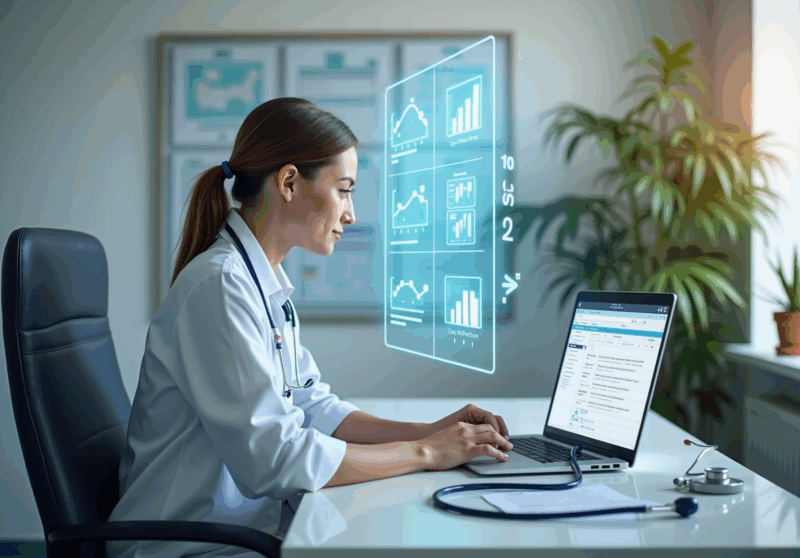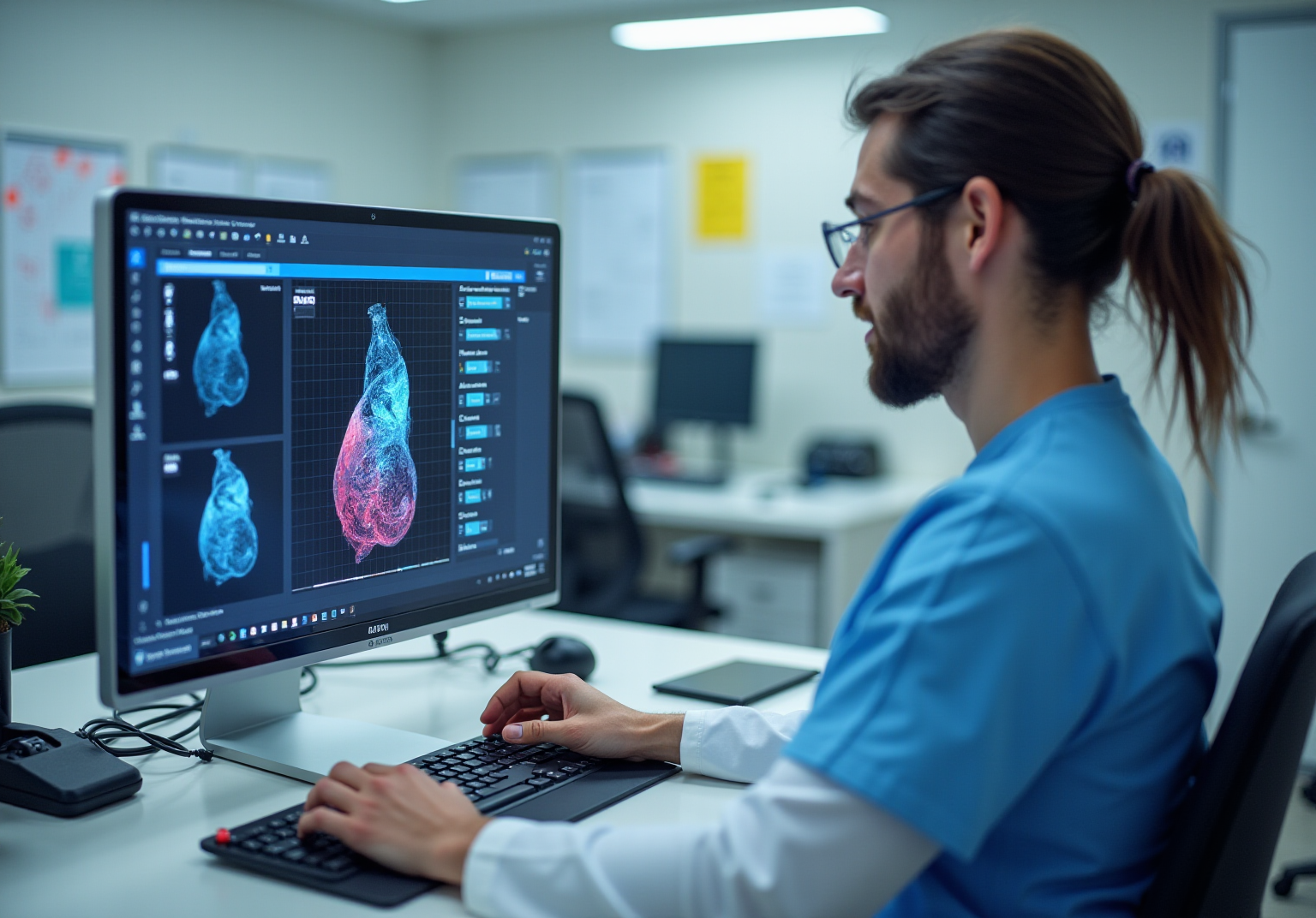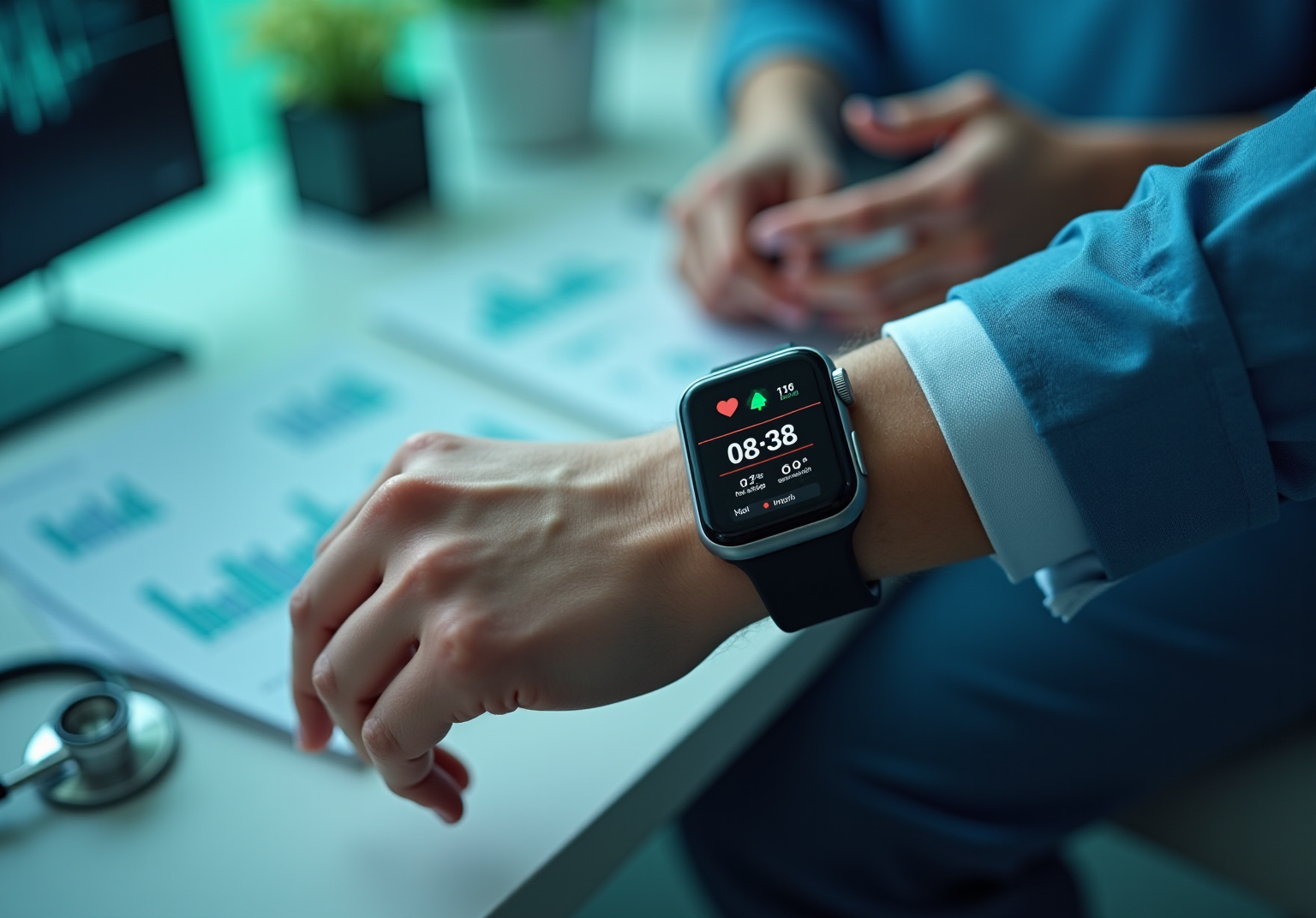
The article explores ten advanced technologies in healthcare that are revolutionizing patient care, such as:
These innovations significantly enhance patient outcomes by:
They exemplify how technology can streamline processes and empower both healthcare providers and patients, establishing a new standard in the industry.
In the rapidly evolving landscape of healthcare, advanced technologies are fundamentally reshaping patient care in unprecedented ways. These innovations streamline processes and enhance the quality of service delivery, ensuring patients receive timely and accurate care. However, as these technologies become integral to healthcare systems, significant questions emerge regarding their impact on traditional practices and the challenges associated with their implementation.
What are the most significant advancements transforming patient care today, and how do they effectively address the complexities of modern healthcare?
The Inferscience HCC Assistant signifies a major leap in advanced technology in healthcare, aimed at optimizing the coding process through automation. By effectively collecting and analyzing clinical data, it provides timely coding suggestions right at the point of care. This automation alleviates the administrative burden on medical providers and is instrumental in maximizing Risk Adjustment Factor (RAF) scores, which directly impacts funding from Medicare Advantage contracts.
With its user-friendly interface and seamless integration into electronic medical records (EMRs), the HCC Assistant utilizes advanced technology in healthcare, making it an essential tool for healthcare organizations striving to improve coding precision and efficiency. This focus on automation enhances operational processes and allows providers to dedicate more time to patient care, ultimately leading to improved wellness outcomes.

AI diagnostics harness machine learning algorithms to meticulously analyze medical data, pinpointing potential health issues with remarkable accuracy. By processing extensive datasets from a variety of sources, including both structured and unstructured data, these systems enable healthcare providers to make informed decisions swiftly. The use of advanced technology in healthcare not only enhances the precision of evaluations but also significantly reduces the time required for diagnosing conditions, eliminating manual processes that can lead to inconsistencies.
For example, AI algorithms have achieved an impressive 94% accuracy in tumor detection, often outpacing traditional diagnostic methods. Such advanced technology in healthcare facilitates timely interventions, which are essential for improving health outcomes and optimizing HCC coding documentation. As Ronald M. Razmi notes, AI can enhance every aspect of individual treatment, rendering clinical practice more efficient and effective.
Moreover, diagnostic errors impact over 12 million Americans annually, costing more than $100 billion, underscoring the urgent need for improved diagnostic accuracy through AI. Inferscience’s advanced HCC coding solutions represent a significant leap forward, allowing medical professionals to focus more on patient care while relying on data-driven insights to inform their decisions and enhance risk adjustment, ultimately supporting improved financial outcomes for medical organizations.

Telehealth solutions have revolutionized the medical landscape by providing advanced technology in healthcare, allowing individuals remote access to essential medical services. This innovative technology is an example of advanced technology in healthcare, facilitating virtual consultations, follow-ups, and the remote monitoring of chronic conditions, effectively dismantling geographical barriers. Consequently, quality healthcare becomes accessible to a wider population, especially in underserved areas where traditional healthcare options may be limited.
Notably, telehealth enhances engagement and satisfaction by offering convenience and flexibility in health management. For example, studies reveal that:
Healthcare leaders underscore the importance of telehealth as an advanced technology in healthcare to improve access to services, with many advocating for its ongoing reimbursement at pandemic rates to ensure sustainability. As telehealth continues to evolve, it plays a pivotal role in fostering client engagement and satisfaction, ultimately transforming the care experience.
Predictive analytics utilizes historical data and advanced technology in healthcare to foresee individual needs and pinpoint potential health risks. By scrutinizing patterns within individual data, medical professionals can identify individuals at risk of developing specific conditions, facilitating timely interventions that lead to improved survival rates and enhanced quality of life. This proactive strategy not only significantly enhances outcomes for individuals but also optimizes resource allocation across medical systems, fostering more effective service delivery.
For example, medical providers employing predictive analytics have achieved up to a 50% reduction in hospital readmissions and demonstrated up to a 48% improvement in early disease identification rates for conditions such as diabetes and cardiovascular disease, illustrating the concrete advantages of early intervention.
With Inferscience’s Care Gaps application, providers can effortlessly upload treatment gaps by entering the individual’s list into the app, review suggested gaps within their EHR, and efficiently address them by selecting the relevant gaps and submitting the updated treatment plan. This integration of structured and unstructured data not only streamlines HCC coding documentation but also elevates the overall quality of healthcare information, resulting in better outcomes for individuals.
As industry expert Trishita Deb notes, ‘Advanced technology in healthcare, particularly predictive analytics, is rapidly becoming a cornerstone of personalized and preventive care, enabling clinicians to intervene earlier and deliver more tailored treatments than ever before.
AI education tools leverage natural language processing and machine learning to deliver personalized information tailored to individual medical conditions and treatment plans. This targeted approach empowers individuals to actively engage in their healthcare journey, significantly boosting their participation. Research indicates that increased involvement correlates with higher satisfaction and adherence to treatment plans, ultimately leading to improved health outcomes.
Healthcare providers recognize the importance of these tools, with many noting that personalized education fosters a deeper understanding of health issues, thereby motivating individuals to comply more closely with prescribed treatments. As a result, the integration of AI in client education not only enhances individual experiences but also facilitates more efficient service delivery.
Furthermore, 80% of Americans believe AI can improve the quality of medical services, reduce costs, and enhance accessibility, reinforcing the positive perception of AI in healthcare. Additionally, 40% of U.S. physicians express readiness to utilize generative AI during patient interactions at the point-of-care, highlighting healthcare providers’ willingness to adopt these innovative tools.
However, it is crucial to recognize that 83% of U.S. consumers view the potential for AI errors as a significant barrier to its adoption, underscoring the necessity for careful implementation and oversight.
Robotic surgery represents a significant advancement in surgical techniques, employing advanced robotic systems that markedly enhance surgical precision. This technology facilitates minimally invasive surgeries, which are linked to shorter recovery times and fewer complications.
Studies reveal that robotic-assisted colorectal surgery results in significantly shorter recovery times and a reduced length of hospital stay compared to traditional laparoscopic surgery, particularly among older patients.
Surgeons have noted that the enhanced visualization and dexterity provided by robotic systems not only bolster their capabilities but also yield superior outcomes for patients. As CEO Todd Pope articulated, the precision of robotic systems permits smaller incisions, leading to less trauma and faster healing.
Overall, the integration of advanced technology in healthcare, such as robotic technology into surgical practices, is proving to be a transformative factor, enhancing both procedural efficiency and the quality of care delivered to patients.
Nonetheless, challenges such as high costs and the necessity for specialized training continue to be critical considerations in the broader adoption of this innovative technology.

NLP tools are revolutionizing the way individuals interact with medical professionals by effectively interpreting and processing natural language. This transformation addresses a critical problem: the inefficiencies in documentation that often lead to overlooked information. These advanced technologies in healthcare streamline the documentation of individual interactions, ensuring that vital details are captured with precision. By bridging communication gaps, NLP tools not only enhance the experience of individuals but also contribute to improved medical outcomes through better understanding and engagement.
Medical experts have observed that incorporating NLP into documentation processes significantly enhances precision. This advancement enables providers to focus more on individual treatment rather than administrative tasks. Such a shift is essential, especially given that over 80% of medical data remains unstructured and frequently overlooked in healthcare environments. By automating the transcription of doctor-client interactions, NLP tools enhance documentation efficiency, reduce errors, and ultimately support improved care delivery. The integration of advanced technology in healthcare is not just a trend; it is a necessary evolution in the healthcare landscape.

Wearable wellness technology, encompassing fitness trackers and smartwatches, enables real-time monitoring of essential metrics such as heart rate, activity levels, and sleep patterns. This continuous data collection empowers healthcare professionals to monitor individual well-being efficiently and respond promptly when necessary. Notably, research indicates that individuals using continuous glucose monitors can reduce their A1C levels by an average of 1.5%, showcasing the tangible benefits of real-time wellness data.
Furthermore, real-time information from these devices can lead to a 40% decrease in hospital visits, underscoring their critical role in proactive wellness management. Additionally, wearable technology has the potential to cut hospital costs by as much as 16% in the coming years. By enabling individuals to take charge of their health, wearable technology not only enhances personal health outcomes but also transforms overall service delivery, fostering a more engaged and informed user base.
As market research expert Trishita Deb notes, “With growing advancements in wearable technology, individuals can now track their chronic conditions and share their information with their medical providers in real-time, which assists in delivering precise diagnosis.” This integration of advanced technology in healthcare is paving the way for a more responsive and personalized approach to patient care.

AI mental wellness support tools are revolutionizing how individuals access and engage with mental wellness resources. By harnessing advanced algorithms to analyze user inputs and behaviors, these tools provide personalized recommendations tailored to individual needs. This groundbreaking technology not only broadens access to psychological support but also empowers users to actively participate in their mental wellness, leading to significantly improved outcomes.
For example, AI therapy chatbots have shown a remarkable 64% reduction in depression symptoms in controlled studies compared to traditional methods, underscoring their effectiveness in delivering timely and relevant support. Furthermore, AI-driven diagnostic tools have achieved up to 100% precision in identifying specific mental wellness conditions, although accuracy may vary across different conditions.
As mental wellness experts increasingly recognize the significance of technology in treatment, the integration of AI tools is paving the way for a more accessible and customized approach to mental wellness services, ultimately bridging service delivery gaps and enhancing overall patient outcomes. Notably, AI tools have resulted in a 235% increase in referrals among non-binary individuals, highlighting their impact on equity in mental wellness.
However, it is crucial to address the potential ethical concerns surrounding AI in mental health care, ensuring these innovations are implemented with responsibility.
Data security in medical technology is not just important; it is essential for maintaining trust and ensuring compliance with regulations such as HIPAA. As medical organizations increasingly adopt advanced technology in healthcare, the protection of individual information becomes critical. Implementing robust security measures—including encryption and access controls—plays a vital role in safeguarding sensitive data from breaches and unauthorized access. Notably, unauthorized access can be reduced by 45% with unique user identification, underscoring the effectiveness of specific security measures. By prioritizing data security, medical providers can cultivate trust with their patients and ensure adherence to regulatory standards.
Cybersecurity experts emphasize that the key takeaway from this year’s devastating breaches is their preventability, highlighting the necessity of implementing foundational security controls. Furthermore, the financial implications are stark; the average cost of a data breach is $7.42 million. This figure illustrates the severe consequences of inadequate data security. With a staggering 34% year-over-year increase in breaches due to vulnerability exploitation, it is imperative for healthcare organizations to remain vigilant and proactive in their security efforts.

The integration of advanced technologies in healthcare is fundamentally reshaping the patient care landscape, driving significant improvements in efficiency, accessibility, and overall health outcomes. From AI diagnostics that enhance accuracy in patient assessments to telehealth solutions that expand access to quality healthcare, these innovations are not mere trends—they are essential components of modern medical practice. The focus on streamlining processes, empowering patients, and ensuring data security underscores the transformative potential of technology in delivering superior healthcare services.
Key advancements such as predictive analytics and AI patient education tools illustrate how data-driven insights can lead to proactive care and informed patient engagement. Robotic surgery and wearable health technology further exemplify the shift towards precision and real-time monitoring, enabling healthcare providers to deliver tailored treatments and interventions. Collectively, these technologies contribute to improved patient experiences and outcomes, while also addressing critical challenges such as administrative burdens and communication gaps.
As the healthcare industry continues to evolve with these innovations, it is imperative for stakeholders to prioritize the responsible implementation of technology. This includes ensuring robust data security measures to maintain patient trust and compliance with regulations. The potential for advanced technologies to enhance patient care is immense, and embracing these changes will be vital in shaping the future of healthcare. Engaging with these advancements not only improves individual health outcomes but also fosters a more efficient and equitable healthcare system for all.